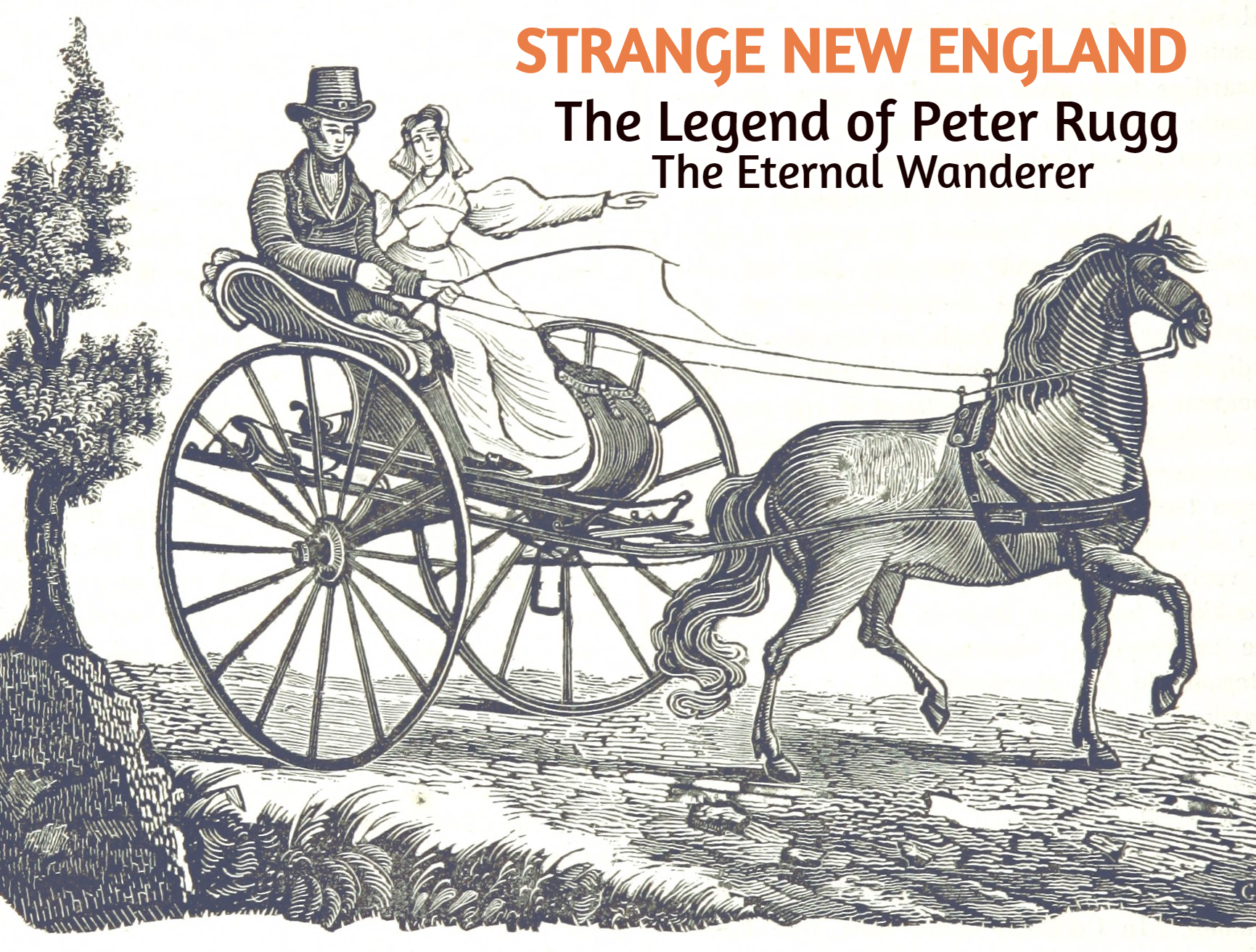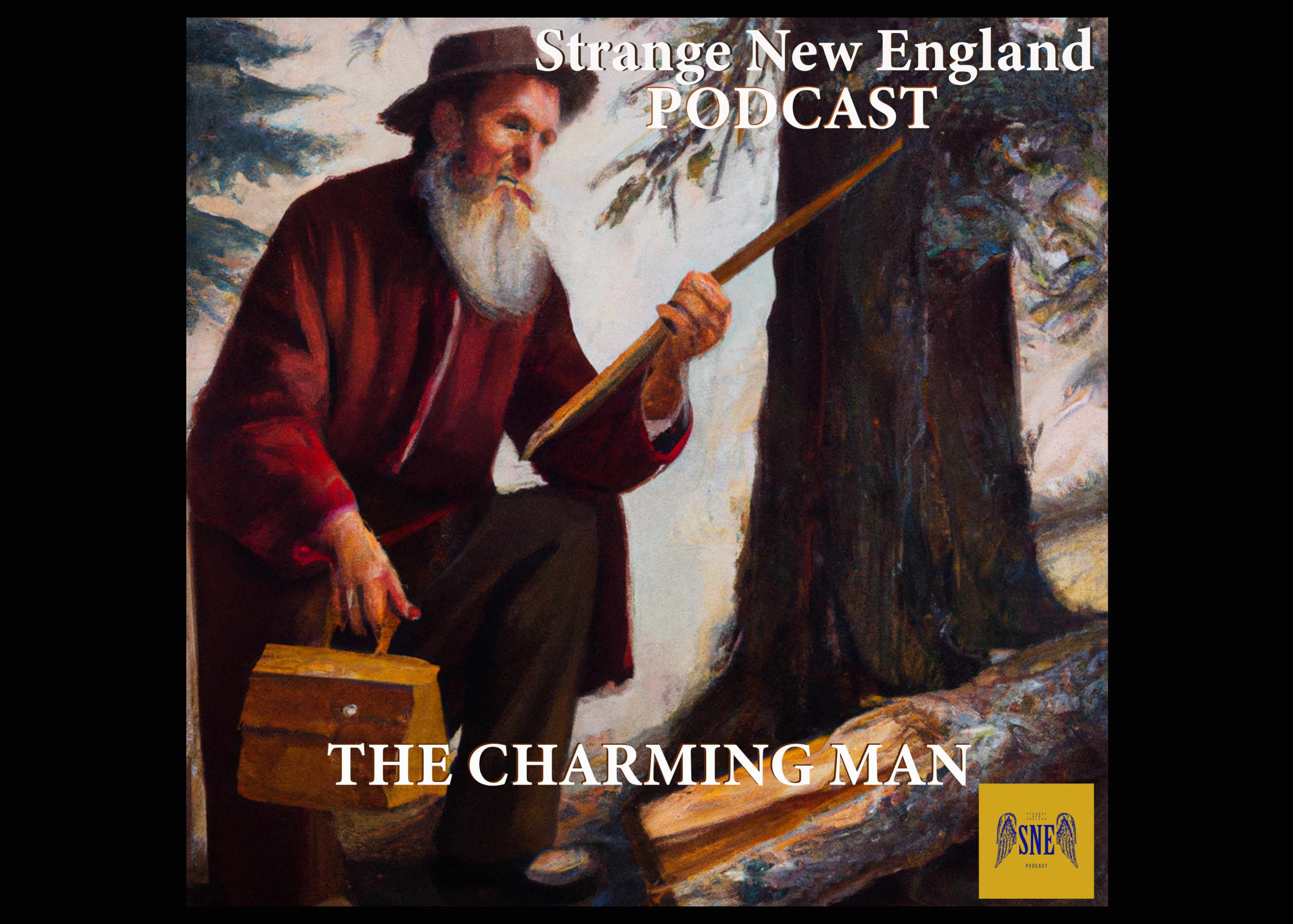
There is a legend in the northeast of a man condemned to ride the storm for all eternity. When folks first started describing the man and his conveyance, he was always seen running just ahead of a fierce thunderstorm that appeared out of nowhere, in an open carriage being drawn by a fierce bay horse. Sitting next to him is his small daughter, perhaps no more than six years old. They are both soaking wet and their faces are both covered in panic and fear. The carriage is being driven at a frenetic pace for just behind this strange pair is a sky of tight rolling black thunderheads and the sound of distant thunder begins to fill the air. If you ask around, you are sure to find someone who has either seen the man himself or at least knows someone who has.
They say that if you’re of a mind to speak with him and he notices you, he is likely to slow the beast that pulls his rig just long enough to stop and ask you a single question.
“Which way to Boston?”
You might find the words to tell him if you are not stupified by the sight your eyes behold. Then he will give you a weary look and crack the whip and continue the long journey home. The man’s name is Peter Rugg and he is cursed by God or the Devil to ride the road to Boston forever without ever reaching his final destination. He is no ghost or demon, but a mortal man doomed to roam the hills and byways until Kingdom Come, a kind of Flying Dutchman of New England.
Thomas Cutter of West Cambridge claimed that Peter Rugg stopped at his place just before he was lost in the stream of time. They were friends and Rugg has been driving that great bay all day in an effort to get home before dark. He took rum and when Cutter told him he should consider staying the night rather than face the storm, Rugg’s violent temper arose and exclaimed “Let the storm increase! I will see home tonight in spite of the storm or may I never see home!” And with that, he raised his whip high in the air and the horse bolted to action.
But Peter Rugg and his little daughter Jenny never made it home. His wife, Catherine, grew old and died waiting for him, though she must have found it strange that every so often, someone would mention to her that they had seen a man on the road who looked like Peter who had stopped and asked for directions to Boston. Later, years after Catherine Rugg’s demise, a woman called Mrs. Croft tells of a strange visit from a man and his small daughter in a weather-beaten black carriage, just at twilight. Mrs. Croft relates that the man asked her about Catherine Rugg. Mrs. Croft informed the man that Mrs. Rugg had passed on more than twenty years ago.

“How can you deceive me so?” he asked. “This is my home. Go find Mrs. Rugg and have her come to the door, at once!” he demanded. Mrs. Croft assured him that no one lived in that place but herself. The confused man steps back and reexamines the house. “Though the paint looks rather faded, this resembles my house.”
“Yes,” the disheveled and tired child says, “there is the stone before the door that I used to on to eat my bread and milk.”
“Yes,” the man replies, “but this cannot be my house. It is on the wrong side of the street, no doubt. Tell me,” he asked Mrs. Croft, “what town is this?”
“Town? Why, this is Boston,” she answers.
“This is Boston?” he asks, incredulously. “But it seems so different. Well, at any rate, you can see I am wet and weary and I need a place to rest. I will go to Hart’s Tavern, near the market.”
“What market?” she asks.
“You know there is but one market near the town dock,” he exclaims.
Mrs. Croft considers and then, after a moment replied, “Oh, you mean the old town market. But no one has kept there these twenty years!”
The gentleman pushes down is ire and replies mostly to himself, “So strange. How much this looks like Boston. It certainly has a great resemblance to it; but I perceive my mistake now. Some other Mrs. Rugg. Some other Middle Street and some other market.”
Then he looks at the woman again and asks, “Madam, can you direct me to Boston?”
The story is told over and over again. Travelers who encounter the missing man on the road are always asked which way to Boston. He is seen as far south as Virginia and as far north as Portland. If you can perceive him at the right time of day, just at twilight, the lightning in the clouds will show you the image of a giant horse with eyes of flame filling the expanse between black clouds. As far as anyone can tell, Peter Rugg is still on the highway, racing against the storm to make it home. Long haul truckers have made the claim that they have encountered the horse and carriage on a lonely road at twilight, a frightened man at the wheel, a girl holding onto his coat for dear life as they barrel on toward oblivion. Some have reported that the conveyance was struck by a bolt of lightning and that Peter and his daughter glowed like brimstone for a moment afterwards.
The idea of a man lost in a wheel of time, a closed loop never to allowed to meet the end of a journey, is an old tale. The idea of an eternal wanderer goes back far in our memory. Cain is cursed for killing his brother Abel and lying to God about it. His curse is to be marked and to wander so that all may know him by the sign God has put upon him. There is also the legend of the Wandering Jew who denied Christ and was condemned to roam the world until Christ’s second coming. There is punishment in these tales, punishment in not recognizing the authority of God. The concept is familiar to those who have read Coleridge’s The Rime of the Ancient Mariner – a sailor who kills a sacred bird, the albatross, and thus sins against God, is doomed to wander the world and tell his story to whoever will listen.
The Legend of New England’s own eternal wanderer left its impression on a few of our writers, as well. Nathaniel Hawthrone knew the story while a student at Bowdoin and even mentions Rugg in his story “The Virtuoso’s Collection” Herman Melville alludes to him in “Bartleby the Scrivener.” Amy Lowell published a long prose-poem entitled “Before the Storm: The Legend of Peter Rugg,” as late as 1917.
If you look for more modern sightings of poor Peter Rugg, you will find no mention of him. One might hope that over the years he has changed his carriage and horse for a black Chevrolet Impala, wandering the back-roads with his now teenage daughter, always looking for put never actually finding home, lost in some pocket of time separate from the rest of us as punishment for threatening God.
But if you look a little deeper you will find another truth: there are stories that become legends. The classic New England authors who referred to Rugg recalled the tale from their childhoods, assumed it to be just another ghost story told around the fire in the dark nights of winter, a cautionary tale to always honor God and never to make idle threats, as Rugg did. They were remembering something, but it wasn’t a real legend at all. Peter Rugg was the creation of a writer and attorney named William Austin. Under the pseudonym Jonathan Dunwell, Austin wrote a tale entitled “Peter Rugg: the Missing Man” published in 1824 in The New England Magazine, a publication of the Boston Masonic Temple. Written as a long letter and in the first person, it had the appearance and feel of an actual account, told by a credible narrator about actual events that had occurred over the years involving a man lost in time, always riding before a violent storm, pulled by a horse with eyes of red. It is likely that because of the nature of the writing and the number of reprints (there were no copyright laws enforced in America at that time), people might have easily assumed that Peter Rugg was an actual Bostonian who had the bad luck to be cursed by God. Who could blame those people who thought he was real – after all – as outlandish as this tale is, we all know what it is like to be lost, to not know where home is, to be aimlessly wandering, at least for a few moments, disconnected from everything we know. Perhaps that basic human fear – of being lost or abandoned, of being disconnected, is the reason the tale of Peter Rugg resonates even today.
In Austin’s writing, Rugg actually makes it home and like some vehicular Rip Van Winkle. Sixty years have passed, his wife is long dead, and he arrives at his home just as it is being auctioned off. Rugg is confused, demands to know how such a thing has happened – how such a strange thing has happened. Then, one of the men in the crowd speaks, saying, “There is nothing strange here but yourself, Mr. Rugg. Time, which destroys and renews all things, has dilapidated your house and brought us here. You have suffered many years an illusion. The tempest which you profanely defied at Menotomy has at length subsided; but you will never see home, for your house and wife and neighbors have all disappeared. Your estate, indeed, remains, but no home. You were cut off from the last age, and you never can be fitted to the present. Your home is gone, and you can never have another home in the world.”
So if you’re on the road and a stranger happens by and stops you to inquire the way to Boston, be kind. Assure him that all will be well, for that is all you can do. No matter what you tell him or which way you direct him, the poor man is destined to roam the highways with his little daughter, always looking for and alas, never finding, home. And remember, it’s only a story. Funny – how it haunts us, even though its just a tale. Maybe it’s because we too have been lost on a dark and stormy night, just hoping and praying that we’ll find our way home.
NOTE: If you would like to hear William Austin’s original tale of high strangeness, we’ve created a recording for your listening entertainment.




